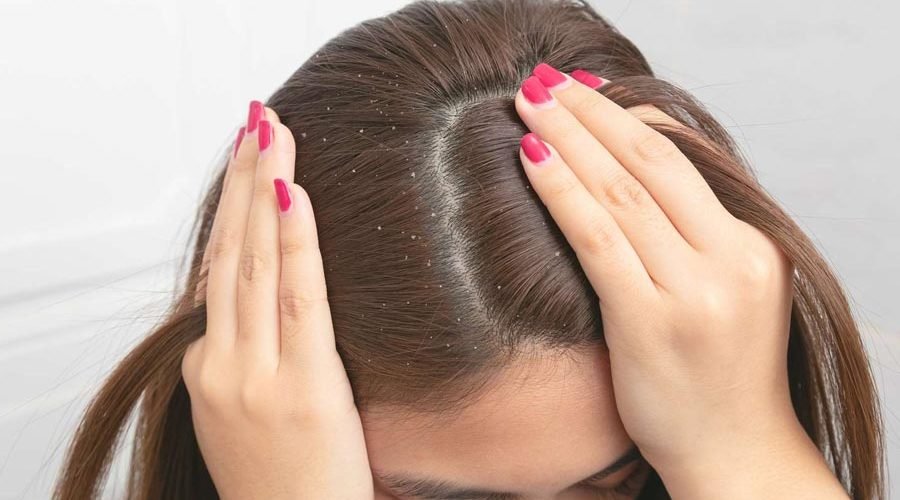Dandruff is a common condition that causes the skin on the scalp to flake. While it is not a serious medical condition, it can be embarrassing and uncomfortable. The exact cause of dandruff is not fully understood, but some factors that can contribute to it include:
- Yeast overgrowth: A fungus called Malassezia can overgrow on the scalp and cause dandruff. This fungus feeds on the oils in your hair and scalp and can lead to irritation and flaking.
- Dry skin: Dry skin on the scalp can cause itching and flaking, leading to dandruff. Cold, dry weather and harsh shampoos can also contribute to dry skin.
- Skin conditions: People with conditions like eczema, psoriasis, or seborrheic dermatitis are more prone to dandruff.
- Diet: A poor diet, particularly one lacking in zinc and B vitamins, can contribute to dandruff.
Table of Contents
The symptoms of dandruff include:
- White, oily flakes of skin on your scalp and hair
- Itchy or irritated scalp
- Flakes that may fall onto your shoulders or clothing
- Dryness or tightness of the scalp
- Scalp redness or inflammation
- A feeling of tingling or burning on the scalp
- Thinning hair or hair loss (in severe cases)
It is important to note that not all flaking on the scalp is dandruff. Other conditions, such as scalp psoriasis, seborrheic dermatitis, or even an allergic reaction to hair products, can also cause similar symptoms. If you are unsure whether you have dandruff or another scalp condition or what is the cause of dandruff, it is best to consult with a dermatologist or healthcare provider.
Here are some tips to prevent dandruff:
- Wash your hair regularly with a mild shampoo.
- Avoid harsh shampoos and styling products that can irritate your scalp.
- Manage stress, as stress can trigger dandruff.
- Eat a healthy diet with plenty of vitamins and minerals, particularly zinc and B vitamins.
- Use an anti-dandruff shampoo containing ingredients like salicylic acid, selenium sulfide, or ketoconazole.
- Massage your scalp regularly to improve circulation and reduce the risk of dry skin.
- Try natural remedies like tea tree oil, apple cider vinegar, or coconut oil, which may help to reduce dandruff.
Natural treatment of dandruff
There are several natural remedies that can be used to treat dandruff. Some of the most popular ones include:
- Tea tree oil: This essential oil has antifungal properties and can help to reduce the yeast on your scalp that can cause dandruff. Mix a few drops of tea tree oil with a carrier oil like coconut oil and massage into your scalp. Leave it on for 30 minutes before washing your hair.
- Apple cider vinegar: Apple cider vinegar has natural acids that can help to reduce the yeast on your scalp and restore the pH balance of your skin. Mix equal parts water and apple cider vinegar and apply to your scalp, massaging gently. Leave on for 15-20 minutes before rinsing with water.
- Coconut oil: Coconut oil has moisturizing properties that can help to reduce dryness and flakiness on your scalp. Massage a small amount of coconut oil into your scalp and leave on for a few hours or overnight before washing your hair.
- Aloe vera: Aloe vera has anti-inflammatory and moisturizing properties that can help to soothe an itchy, irritated scalp. Apply fresh aloe vera gel directly to your scalp and leave on for 30 minutes before rinsing with water.
- Baking soda: Baking soda has exfoliating properties that can help to remove dead skin cells from your scalp. Mix a tablespoon of baking soda with water to create a paste and massage into your scalp. Leave on for a few minutes before rinsing with water.
It’s important to note that natural remedies may not work for everyone and it’s always best to consult with a healthcare provider or dermatologist if your symptoms persist or worsen.
Holistic dermatologist and dandruff
A holistic dermatologist may take a more integrative approach to treating dandruff, focusing on addressing the root cause of the condition rather than just the symptoms. They may recommend a combination of natural remedies, dietary changes, and lifestyle modifications to help manage dandruff.
For example, a holistic dermatologist may recommend increasing your intake of foods rich in zinc and B vitamins, such as nuts, seeds, and leafy green vegetables. They may also suggest reducing your intake of processed foods and sugar, which can contribute to inflammation and worsen dandruff symptoms.
In addition to dietary changes, a dermatologist may recommend stress reduction techniques, such as meditation or yoga, to help manage dandruff. They may also recommend using natural products like essential oils and herbal extracts to help soothe and heal the scalp.
Overall, a holistic approach to treating dandruff can be beneficial for those who want to know what is the cause of dandruff, address the underlying causes of their condition and improve their overall health and well-being.





